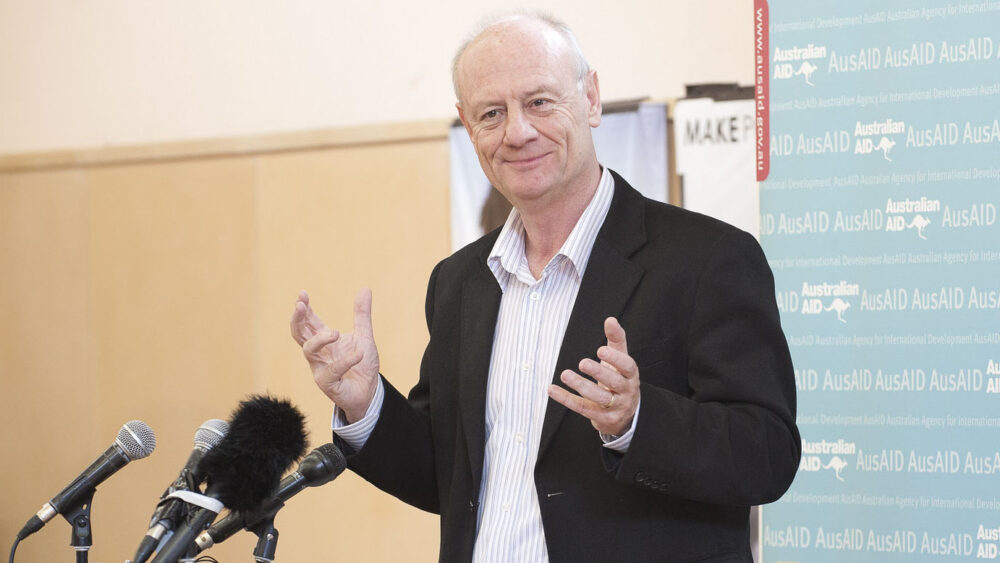The emergence of the Delta strain and now the Omicron variant of the COVID-19 virus increases the urgency of efforts to vaccinate the world, according to the End COVID for All coalition.
“By the end of next year, we want to see 90 per cent of the world vaccinated,” the campaign spokesperson Tim Costello told ABC Radio National this morning.
He was responding to a report that showed how far off that target we are, with only 2 per cent of people in low-income countries already vaccinated.
“Now people go, ‘that’s extraordinary, we’re so far behind.’ I remember with HIV/AIDS you will remember how behind we were, in Africa particularly, and we actually said, ‘we’ve got to get serious.’
“It’s one of those moments again, because not only does it not end for any of us, this is absolutely devastating with allowing mutant variants to develop with epidemiologists saying that the first-generation vaccines will be rendered utterly ineffective within 12 months if we don’t vaccinate the rest – and that that’s going to affect all of us, particularly even those of us with freedom.”
“This celebration has to be put on pause and we’ve got to get really serious about this.” – Tim Costello
Costello said Australians in cities such as Sydney should not be rejoicing in their newly regained freedom.
“I can’t overemphasise for Australians – our rejoicing is a false storm when PNG is only four kilometres across the water from some of the Australian islands and it’s under 1 per cent vaccinated. This celebration has to be put on pause and we’ve got to get really serious about this.”
Costello, told Eternity today that the End COVID For All campaign – a coalition of health and civil society organisations – had been saying for two years that the pandemic would not end for any of us until it ended for all of us.
“But we keep trying to shut the door after the horse has bolted,” he said.
“More national border closures when the only way out to freedom is to vaccinate the poor in the developing world. It turns out the virus doesn’t play favourites like we do in vaccine hoarding and not sharing vaccines and funding adequately the international COVAX facility for Africa and developing nations.”
According to the campaign’s report, A Shot of Hope, 19 low-income countries such as Afghanistan and Malawi have such low rates of vaccination that on current rates they would not vaccinate 70 per cent of their populations until after 2030.
Costello said that statistic was shocking given the target for global vaccination by the end of this year had been 30 per cent.
“That wave, that scare says we have to get them into people’s arms. We can’t muck around.” – Tim Costello
However, there were lessons in the success of three low-income countries, Mozambique, Nepal and Tajikistan, which were on track to reach the target of 70 per cent fully vaccinated by the end of 2022. And in our region, Fiji has reached 51 per cent, while PNG is still under 1 per cent.
“The lesson really is, when you have a wave as Fiji did and these countries did, and Sydney did, you go, ‘the only way out is vaccination.’
“You get really serious; you then have a financial means – and this is what the COVAX facility is – that we’re saying is going to be $U50 billion to vaccinate the whole world. You then have financial help to actually get the vaccines. And that wave, that scare says we have to get them into people’s arms. We can’t muck around.”
Speed is of the essence because the faster we vaccinate, the lower the likelihood of mutations developing.
Costello said rich nations such as Australia had to lead the way in funding the global vaccination effort, seeing it as an investment, not a cost.
While Australia had been quite generous in its contribution to the COVID-19 response in our region, it needs to do more. The report urges the Australian government to contribute an extra $A250 million to the global COVAX facility, to share 20 million vaccines through the COVAX facility, and commit $50 m to address vaccine hesitancy.
It also recommends supporting an Ind0-Pacific technology transfer hub to support establishing mRNA manufacturing capacity in the region and recommends Australia becoming a vaccine production factory for the region.
“The rich have to fund this,” Costello emphasised. “The countries that have done well have been helped to buy those vaccines and we know how difficult it has been to get them … We got them because we could afford to.”
While Costello applauded pharmaceutical companies for their“extraordinary achievement of making this vaccine so quickly” he urged them not to put profits before people.
“An invisible virus shows us we are utterly interdependent, utterly, equally vulnerable.” – Tim Costello
He welcomed the lifting of the trade-related intellectual practices patents, which would allow poorer nations to make their own vaccines.
“That is, I think, going to be really critical to getting to 90 per cent by the end of next year of the world vaccinated.”
On the question of the morality of giving booster shots to Australians while poor health workers in many countries haven’t even had one shot, Costello said “If we’ve got the capacity to do both, and that’s the ideal, to have booster shots and to vaccinate the world, then we don’t have a debate.
“But our focus is always nationalistic. It’s always us. It’s always our needs. We actually have created an illusion because this virus has shown us the world is biologically connected. An invisible virus shows us we are utterly interdependent, utterly, equally vulnerable. Therefore, the notion of looking after ourselves and we’ll get our booster shots up for the whole population – they can wait – makes no sense. It’s complete madness.”
Email This Story
Why not send this to a friend?


